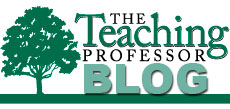 Occasionally we need a reminder like this: based on a thorough literature review, Paul Ramsden, a noted researcher on teaching and learning, along with several co-authors offered this description of good teachers.
Occasionally we need a reminder like this: based on a thorough literature review, Paul Ramsden, a noted researcher on teaching and learning, along with several co-authors offered this description of good teachers.
CURRENT ARTICLE • March 02
OTHER RECENT ARTICLES
It’s that time of the academic year when enthusiasm for teaching and learning are harder to find. Spring semester or term courses are no longer new. Even though the feedback has clearly indicated that this course won’t be an easy A, many students have yet to buckle down and start studying seriously. The winter drags on ... especially for those of us who are unaccustomed to major snowstorms and way behind due to cancelled classes.
Read More ›“Teachers shouldn’t expect to make a difference in the life of every student. They don’t and won’t. But making a difference in one life is a powerful motivator. We never forget those students who tell we have, and we are further motivated by those teachers who once made a big difference in our lives.”
Read More ›I was looking something up and happened on this brief identification of the defining characteristics for problem-based learning (PBL). Not only does it offer a great review, but it reminds us why PBL is such a powerful pedagogical strategy.
Read More ›When I took an ungraduate chemistry course a few years back, I loved lab, but I have to admit writing up the lab reports seemed like so much busy work. Each report had specified sections, and the lab manual offered advice on what to put in the sections, depending on the experiment. I remember trying to get them done in a hurry and thinking that I wasn’t learning much by doing them. They seemed more like something the instructor could use to make sure you (and your partners) had actually done the lab.
Read More ›I strongly believe in reflective practice. In this blog and the newsletter I try to show teachers the value of looking closely at our teaching selves—what we believe and how those beliefs play out as classroom policies and practices. Teachers don’t learn much from experience unless that experience is examined closely, carefully, and with an openess to critique.
Read More ›Here’s an interesting new word: “courseocentricism,” obviously related to words like ethnocentricism and egocontricism, it’s defined as “a kind of tunnel vision in which we become so used to the confines of our own course that we are oblivious to the fact that our students are taking other courses whose instructors at any moment may be undercutting our most cherished beliefs.” (p. 157)
Read More ›There’s a piece coming out in the February issue of the newsletter that highlights content from an article written by a political scientist who teaches quantitative content to math averse students. It’s a very pratical piece but also a great model—of pedagogical scholarship and of something we should all consider doing.
Read More ›I meet regularly, usually over breakfast, with my good friend and colleague Larry. We share our papers, ideas, and good stuff we’re reading. I am so lucky to have this wonderful pedgogical colleague. I’ve been working on a paper that explores the knowledge bases for teaching, one of which is the experiential knowledge faculty derive from time spent in the classroom. I used the old cliché about experience being a great teacher. Larry was all over that idea. Experience isn’t a teacher—it’s yet another case where a metaphor conveys the wrong meaning. Teachers work to form and frame content in the interest of helping students learn it. Experience doesn’t do that. Learning from experience is like any other kind of learning—it takes effort and depends on focus, reflection, and practice. It never just happens.
Read More ›




